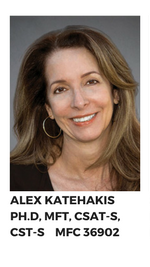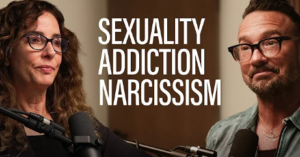February 28-29, 2020
at Antioch University, Culver City, CA
Close to LAX & major freeways
Tuition:
$695
To REGISTER call (310) 843-9902
BBS and APA Credit Available: 15 CEs
Level: Introductory
Two-Day Course: February 28 – 29 (8:30am – 5:30pm)
Lunch included both days
Daily breaks (10am – 10:30am and 2:45pm – 3pm)
This introductory level, 15-hour sex therapy training program is designed for professionals interested in gaining a deeper understanding of sex therapy including etiology, assessment, diagnosis, treatment protocols, and strategies for healthy sex and sexuality. This course offers 15 CEs for the following licensures and certifications: LMFTs, LCSWs, LPCCs, LEPs, Ph.Ds, and AASECT. Dr. Katehakis is a certified sexologist and certified sex therapist. She is the owner and clinical director of Center for Healthy Sex and has 20 years of experience in the field of sexual health.
(15 CEs for APA, BBS, and AASECT)
You will gain a comprehensive overview of the following clinical topics:
- Discuss the basic concepts of sex therapy and common treatment models
- Identify questions clinicians should reflect on prior to practicing sex therapy that will increase awareness of clinical blind-spots and biases
- Describe the physiology of orgasm and the erectile network for men and women
- Identify diversities among gender identities, orientations, and sexual expressions
- Explain assessment protocols for 3 common male and female dysfunctions
- Describe treatment directives for 3 common male and female sexual dysfunctions
- Discuss at least 3 errors to avoid when practicing sex therapy
- Explain how to effectively manage countertransference issues in sex therapy
- Explain at least 3 ways commitment and marriage affect sexuality
- Identify 3 ways that pregnancy, labor, and parenthood affect sexuality
- Discuss effective treatment interventions for sexual health problems caused by advanced aging and physical disabilities
- Discuss key aspects of BDSM & KINK culture
The CHS Sex Therapy Training Course will be held at Antioch University. All mental health professionals are welcome!
Event Disclaimer
CAMFT Approval# 107699
Center for Healthy Sex is approved by the California Association of Marriage and Family Therapists to sponsor continuing education for LMFT’s, LCSW’s, LPCC’s and LEP’s. Center for Healthy Sex maintains responsibility for the program and all its content. Course meets the qualifications for 15 hours of continuing education credit for LMFT’s, LCSW’s, LPCC’s and LEP’s as required by the California Board of Behavioral Sciences.
Center for Healthy Sex is approved by the American Psychological Association to sponsor continuing education for psychologists. Center for Healthy Sex maintains responsibility for this program and its content. Center for Healthy Sex provides free training to all mental health professionals in the interest of increasing knowledge about sexual health issues and there is no commercial support for our educational programs.
This program meets the requirements of the American Association of Sexuality Educators, Counselors, and Therapists (AASECT) and is approved for 15 CE credits. These CE credits may be applied toward AASECT certification and renewal of certification. Completion of this program does not ensure or guarantee AASECT certification. For further information please contact info@aasect.org.
Refund/Cancellation Policy:
Registration fees are non-refundable.
To request accommodations for special needs, or report grievances, please contact (310) 843-9902 or email info@centerforhealthysex.com.




